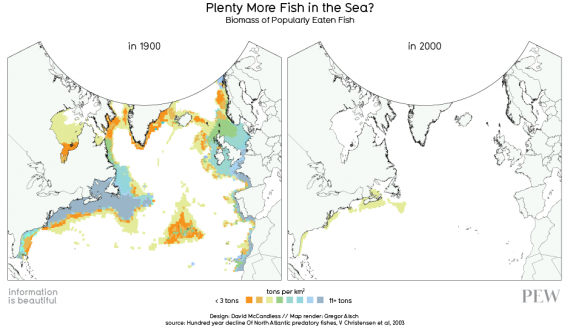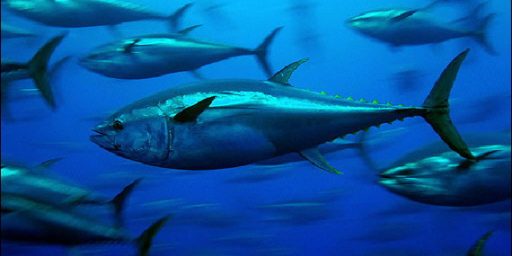Horrifying Graphic of the Day
Overfishing may mean a near term future in which there are no more fish in the sea.
The horrifying graphic of the day, above, contrasts the biomass of popular fish in the North Atlantic in 1900 with the biomass of the same species in 2000. A dramatic change. Source: Villy Christensen of the University of British Columbia Fisheries Centre via Henry Blodget.
There are any number of reasons for the depletion of wild fishery resources worldwide including ocean acidification, other environmental degradation, poor resource management, and just plain too many fishermen and not enough fish. However, according to the United Nations’s Food and Agriculture Organization the single largest cause of over-fishing is government subsidies of domestic fishing fleets.
Historically, Japan’s seafood consumption has been the largest in the world, Japanese consumers have determined world prices, and Japan’s commercial fishing fleet the largest in the world. That has begun to change. China’s commercial fishing fleet is now the largest, much of its catch is sold to Japan, and Japan is importing an increasing percentage of its fish.
Collectively, the European Union’s fishing fleet may well be the largest and most destructive, particularly in the North Atlantic. Our European cousins have an edge in methods, technology, and numbers over other major commercial fishing nations.
Solutions to the problem are elusive. The Neolithic Revolution, the beginning of the transition from hunting and gathering to sedentary agriculture and herding, began ten thousand years ago. If we were still dependent on wild game as our major protein source, we’d have starved to death millennia ago (or be vastly reduced in numbers). Aquaculture, particularly ocean farming, does not appear to be a near term solution to the problem of depletion of the oceans. Most of the desireable species are carnivorous and at the present state of the art ocean fish farming remains heavily dependent on wild catches with each pound of cultivated protein requiring more than a pound of wild protein albeit of different species.
Ocean fisheries would appear to be a classic “tragedy of the commons”, granting or selling exclusive fishing rights to private individuals and companies has frequently been suggested as a solution to overfishing, but I have my doubts. Fishermen operate according to laws of economics not those of conservation. Just to give an example, the amount of edible fish discarded every year is unconscionably vast. When the catch in a net is hauled in it’s not all a single species: multiple species are intermingled. More valuable fish are retained; the others are discarded to make room for the more valuable. In this way every year thousands of tons of perfectly good haddock are discarded from the catch in the North Atlantic. By the time the market has worked its way down to the less desireable species the ocean ecology may well have been disrupted enough to be irrecoverable.
Onboard inspectors have been suggested. IMO this is an utterly unworkable proposal, enormously expensive, suffers from time inconsistency and knowledge issues, and incentivizes piracy, already a substantial problem in fishing.
“Flags of convenience” provide a strategy for evasion of catch limits.
Unless some solution is found within our lifetimes there may be no more fish in the sea.







Looks like Vegans are the hope for the future of the human race.
Good choice in topic, Dave. I bookmarked this one myself.
I personally think the problem is much bigger than the economic interpretations (ie. tragedy of the commons, privatized markets, etc.)
I think it’s a “cookie jar” problem, and we humans will just keep reaching into a cookie jar until they are gone.
(As some of you know, one hope is that oil will become so expensive that fishing fleets have to contract, and won’t be able to look for scarce fish. Now there is a Malthusian solution 😉
“Nothing will benefit human health and increase the chances for survival of life on earth as much as the evolution to a vegetarian diet.” —Albert Einstein
Piracy is a big problem. Of course that could be greatly reduced with going after the buyer. Japan deep sea fishing of salmon is one good example of this.
A big problem is fish don’t adhere to national boundaries. So nations tend to get what they can knowing if they don’t the next nation down the road will therefore making it very hard not to overfish. Creating treaties to handle this is very hard since most countries think they deserve more. Just look at the U.S. and Canada efforts in this area which is just between two countries. Imagine what it is like among multiple countries vying for the same catch.
Bastards.
An examination of the fossil record indicates that there have been even fewer fish in the ocean in the past. Indeed, at one time there were no fish. This is clearly a natural cycle and not a problem created by people. If we let this natural cycle follow its course, there will soon be more fish. There is no need to over react and institute government driven solutions whose only real purpose is to increase the power of government over people.
Steve
There has been at least some anecdotal evidence that underfishing for even a short period of time can lead to dramatically higher fish populations, even in areas where they’d been in decline in the past.
Convincing nations like China and Japan to agree to such policies, of course, is the difficult part.
Doug, you are dumb enough to be dangerous.
Read the Cod cycle. Not only don’t fish rebound, they can be trapped in a new population dynamic, forever.
See also the rise of jellyfish, over fish with a backbone, world-wide.
Really? Do you have any evidence to support that? Does not seem clear to me at all.
I’m pretty sure Steve’s post was pure parody.
Funny thing: I seem to recall lots of pretty pictures, graphs and whatnot, all in color, with circles
and arrows and a paragraph on the back of each one explaining what each one was to be used as evidence against oil drilling, all of them saying that we were all out of oil.
Of course that proved to be not true.
Please show even a single graph that says “we are all out of oil”.
Or you could just write “I am full of it” on the blackboard 100 times…
Here is an interesting article in the radical, eco-freak, left-wing Wall St. Journal about the end of “easy oil” in Saudi Arabia. In other words, “peak oil” which guys like bit have been dismissing as a tree hugger fantasy, is real.
http://online.wsj.com/article/SB10001424052748704436004576299421455133398.html
The article does contain a graph, in color, with circles.
The most devastating part of the over-fishing process has definitely got to be those “trawler” boats with the gigantic fishing nets (miles long in some cases). They completely devastate entire eco-systems in the sea just to catch certain varieties of fish.
That said, there are some schemes out there to try and turn the “tragedy of the commons” aspect of it into something with the right economic incentives. Things like selling licenses to catch a certain number of fish/lobsters/whatever.
We’ll definitely end up with fish adapted to survive in an ocean ecosystem where humanity regularly devastates entire areas with giant fishing nets. My guess is mostly small fish that breed extremely rapidly (and probably don’t make for great food).
I forgot about those, but they’re definitely one of the species that seems to be spreading outward.
The article has a good point, too, about how they’re afraid that the jellyfish will spread so far and prominently that it will kick fish populations into a permanently lower state through predation and competition.
Did Bithead really just compare a resource that takes potentially hundreds of thousands of years to make to one that reproduces yearly?
@Pete: Yes, Vegans may indeed be the future. I’m working on a cookbook to make the best use of them. They’re still a bitch to clean, though.
@anjin-san: “Peak Oil” is a lucrative concept for those who sell the concept–shout out for Matt Simmons! That it absolutely unproved doesn’t make those buying it any smarter. And the ones who try to re-sell it?
Sort of like your statement saying it is unproved.
@Burgess
“Proofs” only exist in mathematics, and that you are unaware of this suggests your understanding of science is less than desireable.
Pucking A, I took beck’s advice and stocked up on caned goods and BBQ sauce:)
There’s an excellent, short presentation by Jeremy Jackson on this subject. Very informative, I encourage everyone to watch it.
http://www.ted.com/talks/jeremy_jackson.html
Frankly, I doubt such measures could be implemented and that they would be effective if implemented.
First, I see no way a system that would be generally ageeable could be arrived at. If licenses are sold to the highest bidder, poor countries will complain. Allocation on a population basis will cause countries without huge populations but are highly dependent on seafood to complain that they are being cheated or starved to death. Countries will undoubtedly demand preferential access to fishing areas nearer their waters.
Second, how would such a system be enforced? Piracy is already a major problem. Any allocation system will incentivize various forms of cheating some of which are mentioned in the post.
It would probably be simpler and more enforceable simply to ban trawlers over a certain (small) size. That will garner complaints from China, Japan, Spain, Norway, and France but their fishing fleets are the ones doing the most harm.
Funny isn;t it – how all the libertarian types somehow fail to recognize how fishery issues form one of the purest examples of how markets fail – how unregulated markets are, in fact, DOOMED to fail.
Its called the tragedy of the commons – how in the absence of some regulatory mechanism that defines and enforces stakeholding interests in a particular resource, the operation of free men in the unregulated market will inevitably lead to disaster. Every man pursuing his own narrow self-interest leads to overexploitation of the resource. No one person will ever have it in their narrow self interest to operate in a sustainable manner – for to do so would lead to their economic demise in the short term (being out competed by those less concerned ), even as the resource becomes doomed in the long term.
These resources need to be regulated by those who can see and understand the long-term dynamics of the resource – in the case of fisheries, that means population biologists informing a government with effective enforcement powers.
These measures do work well, so long as the enforcement can be implemented. That is a big “if” though, given the resistance that individual fishermen tend to exhibit, the costs of effective enforcement, and the political mess that arises when politicians pander to those who whine the loudest. When it comes to the international stage, all the problematical issues are magnified many times over.
The result is as we see. An almost unstoppable deterioration of the resource. Thanks to glorious economic freedom.
An examination of the fossil record indicates that there have been even fewer fish in the ocean in the past. Indeed, at one time there were no fish.
Not bad, I’ll say A-. Could have been an A+ if you avoided giving it away on the second sentence.
By the way, and in case you haven’t heard, fish is pretty good for you. Einstein may have been correct, but if there’s one ‘meat’ that’s worth the cost, it’s fish.
Franklin,
Fish oil is good for you. That gain is probably offset by the amount of pollutants in fish now, particularly mercury, which is an outright poison. It is not the health train wreck that most of the beef people in this country eat.
Health is one reason I am a vegetarian, but only one.
At any rate, the coming collapse of fisheries was something you could see coming in the 70s. Einstein, being brighter than most, probably saw it much earlier.
Sadly anjin, this is a situation where personal action has no effect on the long term outcome.
The ratio of people to fish is too high.
“Really? Do you have any evidence to support that? Does not seem clear to me at all.”
LOL
steve has a good, sarcastic sense of humor. He got ya.
Now I’m goin’ fishing……..
Steve wins. That was well done.
I am doing my part – I eat almost no fish. I hate the stuff. 🙂
I didn’t realize we had such sophisticated measuring equipment in 1900.
I don’t know, steve wins but charles is giving him a run for his money!
Yes, how dare I question science!
Anyone want to go fishing?